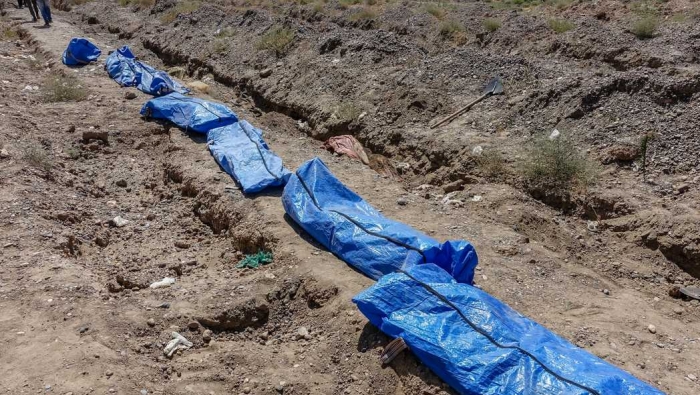Baladi - Newspapers
At Raqqa's zoo, families once visited the peacocks, gazelles and leopards.
They are long gone now. What remains between the pockmarked structures that once housed them are trenches, a dozen of them about 200 yards long, where workers extract bodies thinly covered by topsoil.
The zoo is one of the sites where nine mass graves have been found, say local authorities and international observers. It's where the most heartbreaking of work goes on as Raqqa struggles to dig itself out from the legacy of the Islamic State and the campaign to oust it.
“Usually we find one or two bodies wrapped in a blanket, but in one of these trenches three to four bodies were found barely covered by a single shared blanket," Mohammed Assad, the on-site doctor, said as he supervised exhumations for the Raqqa Civil Council Emergency Team.
And then there are even more chilling finds. “There was what seemed like an executed body, where the head was placed separately from the body,” he said.
For nearly three years, this city of 300,000 in north-central Syria served as the capital of the Islamic State's self-proclaimed caliphate, a territory spanning Syria and Iraq and nearly as large as Italy.
Liberated in October 2017 by a coalition campaign after three years of being terrorizing by the militant group, the local population is now trying to rebuild from rubble and restore basic services such as water and electricity. But first, many say, they must find their loved ones and bury their dead.
Since this spring, Assad and other members of the team have found hundreds of bodies buried by IS fighters and civilians caught up in the conflict. Tens of thousands remain missing as corpses continue to decompose in public parks and under the rubble of homes – mines placed by IS make it difficult to access some of the dead.
Still, most of the attention is focused on the sites of the mass graves that were used by IS but also by families.
There is some worry about the excavations: Human Rights Watch, which has sent observers to Raqqa’s mass grave sites, says the local teams are in dire need of technical assistance.
“If workers continue to exhume the graves without adequate technical training, equipment, and support, families may lose the opportunity to accurately identify the remains of their loved ones,” said Priyanka Motaparthy, acting emergencies director at Human Rights Watch. “Evidence regarding crimes in the area, including IS crimes, may be lost.”
Source: USA Today

